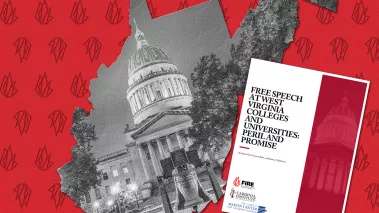Table of Contents
REPORT: Free speech in peril at West Virginia colleges

PHILADELPHIA, June 20, 2022 – West Virginia’s four-year colleges and universities maintain nearly 100 policies that restrict freedom of speech, according to a new report from the Foundation for Individual Rights and Expression, the Cardinal Institute for West Virginia Policy, and the James G. Martin Center for Academic Renewal.
“Freedom of speech is a core West Virginia value,” said Cardinal Senior Fellow Adam Kissel. “But Mountaineers are not always free on our college campuses.”
FIRE reviewed the speech codes—policies that prohibit expression that would be protected by the First Amendment in society at large—at 17 public or private colleges and universities in West Virginia and found 92 policies that restrict freedom of speech. 47% of those West Virginia institutions earned FIRE’s worst, “red light” rating for clearly and substantially restricting free speech, while just 18.5% of schools earn that rating nationally.
FIRE found 13 speech codes at Glenville State College, nine at Concord University, and seven at Fairmont State University. Bethany College, University of Charleston, Wheeling University, Bluefield State College, and Potomac State College of West Virginia University each have six speech codes.
West Virginia University and West Virginia University Institute of Technology each have only one speech code, putting them one policy away from a FIRE “green light” rating, which is awarded to schools with no policies that imperil free expression.
“Speech codes chill free speech on campus,” said FIRE Director of Policy Reform Laura Beltz. “Unconstitutional policies harm students and risk costly, embarrassing litigation.”
West Virginia Wesleyan University bans “attitudes of condescension” and emails with “gender-specific comments.” Glenville State College bans “unsought … requests for dates,” “lewd … sounds,” and “questions about someone’s … sexual orientation.”
University of Charleston bans language that can “potentially result in another student feeling … embarrassed” and censors posters that are not “in good taste.” West Liberty University bans “hate speech” and Shepherd University bans “hate activities that demean [or] ridicule … other members of the campus,” even though most speech commonly identified as “hate speech” is protected by the First Amendment and cannot be censored.
The report’s authors look forward to opportunities to work with West Virginia institutions to conform their policies to their free speech commitments and obligations. In addition, legislators could improve upon Senate Bill 657, which reinforced those obligations in 2021; the state’s Higher Education Policy Commission can use this analysis in its upcoming report to the Legislative Oversight Commission on Education Accountability (LOCEA) on barriers to free expression on campus; and students can advocate for the expressive rights they are due.
A decade ago, the Martin Center produced a similar report regarding free speech at North Carolina colleges, finding no colleges with a “green light” from FIRE. But over time, North Carolina became the top state for green light institutions, with an amazing 15 of them—more than two-thirds of the state’s institutions rated by FIRE.
“North Carolina has achieved remarkably strong compliance with First Amendment principles,” said Martin Center President Jenna A. Robinson. “West Virginia has an incredible opportunity to ensure free speech for its students.”
***
The Foundation for Individual Rights and Expression is a nonpartisan, nonprofit organization that defends and sustains the individual rights of all Americans to free speech and free thought—the most essential qualities of liberty.
The Cardinal Institute for West Virginia Policy, Inc. is a 501(c)(3) non-profit founded in September 2014 dedicated to research, develop, and communicate effective free market economic public policies for West Virginia.
The James G. Martin Center for Academic Renewal is a nonprofit institute dedicated to improving higher education in North Carolina and the nation. Located in Raleigh, North Carolina, it has been an independent 501(c)(3) organization since 2003.
CONTACT:
Katie Kortepeter, Media Relations Manager, FIRE: 215-717-3473; media@thefire.org
Recent Articles
FIRE’s award-winning Newsdesk covers the free speech news you need to stay informed.

Harvard stands firm, rejects Trump administration’s unconstitutional demands

FIRE comment to FCC calls for review of regulations that may violate the First Amendment

FIRE statement on immigration judge’s ruling that deportation of Mahmoud Khalil can proceed
